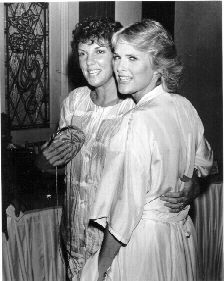
Cagney and Lacey: The Return
New York magazine, November 7, 1994
In my house, Cagney & Lacey was to prime time what The Golden Notebook had been to modern novels and modern marriage: street-smart feminism; politics and friendship; therapy on the barricades; brains on a rampage. Before Doris Lessing, we had never heard women talk like that in fiction. Before Cagney & Lacey we'd never seen them act like that on television. Without Chris and Mary Beth, Thelma and Louise would not have been imaginable. And so it's a joy to have them back for a coup of hours in Cagney & Lacey: The Return; older, thicker, smarter, wrinkled and not the least bit apologetic about it.
Cagney (Sharon Gless) now works for the district attorney. She is also married to a wealthy businessman (James Naughton) she met at meetings of Alcoholics Anonymous, a "Friend of Bill" in line for an important job in Washington. Lacey (Tyne Daly) retired from the force after twenty years, to homemake for husband Harvey (John Karlen) but finds herself cash-strapped when he has a heart attack. Cagney not only needs help in her sensitive investigation of a gun heist in which a cop was killed-one of the suspects is her ex-colleague Marcus Petrie (Carl Lumbly)-but also, more crucially, misses the old dialectic of two intelligences and two temperaments, out of which the two women used to synthesize a method and a meaning.
Because Cagney lives in a Manhattan brownstone, where her husband hates her gun, while Lacey's still in Queens, where Harvey has opinions on Julius and Ethel Rosenberg, the old class consciousness of the series is still intact, and so are the edgy politics, and so, even, is the executive producer Barney Rosenzweig, who shows up like Hitchcock in a cameo on the courthouse steps. While Chris and Mary Beth renew their partnership, they must cope in a script by Terry Louise Fisher and Steve Brown with caviar, hair dye, Spandex, the Federal Witness Protection Program, whether 1,500 weapons are already on their way to Ireland or Peru, police corruption, and menopause. The Return is a terrific reminder of the good old days, before Camille Paglia.

Back to start of Cagney and Lacey section
My Index Page
|